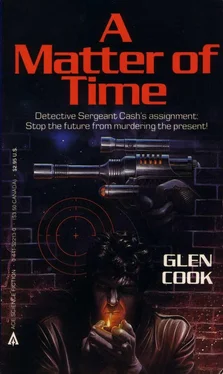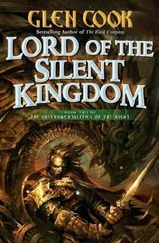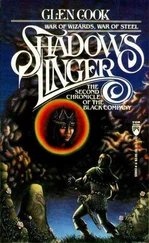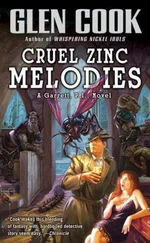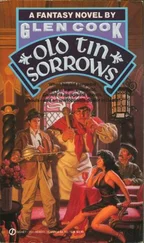Glen Cook - A matter of time
Здесь есть возможность читать онлайн «Glen Cook - A matter of time» весь текст электронной книги совершенно бесплатно (целиком полную версию без сокращений). В некоторых случаях можно слушать аудио, скачать через торрент в формате fb2 и присутствует краткое содержание. Жанр: Детективная фантастика, на английском языке. Описание произведения, (предисловие) а так же отзывы посетителей доступны на портале библиотеки ЛибКат.
- Название:A matter of time
- Автор:
- Жанр:
- Год:неизвестен
- ISBN:нет данных
- Рейтинг книги:5 / 5. Голосов: 1
-
Избранное:Добавить в избранное
- Отзывы:
-
Ваша оценка:
- 100
- 1
- 2
- 3
- 4
- 5
A matter of time: краткое содержание, описание и аннотация
Предлагаем к чтению аннотацию, описание, краткое содержание или предисловие (зависит от того, что написал сам автор книги «A matter of time»). Если вы не нашли необходимую информацию о книге — напишите в комментариях, мы постараемся отыскать её.
A matter of time — читать онлайн бесплатно полную книгу (весь текст) целиком
Ниже представлен текст книги, разбитый по страницам. Система сохранения места последней прочитанной страницы, позволяет с удобством читать онлайн бесплатно книгу «A matter of time», без необходимости каждый раз заново искать на чём Вы остановились. Поставьте закладку, и сможете в любой момент перейти на страницу, на которой закончили чтение.
Интервал:
Закладка:
Glen Cook
A matter of time
I.On the Z Axis;
12 September 1977;
At the Intersection
Total darkness. Silence broken only by restless audience movements.
Suddenly, all-surrounding sound. A crossbreed, falsetto yodel/scream backed by one reverberating chord on the bass guitar. A meter-wide pillar of red light waxes and wanes with the sound.
Erik Danzer is on.
Nude to the waist, in hip-deep vapor, he rakes his cheeks with his fingernails. He is supposed to look like an agonized demon rising from some smoldering lava pit of hell.
Light and sound depart for five seconds.
Owlhoot sound from the synthesizer.
Sudden light reveals Danzer glaring audience right. Light and sound fade. Repeat, Danzer glaring left.
Harsh electric guitar chords, with the bass overriding, throbbing up chills for the spine. Mirror tricks, flashing, put Danzer all over the stage, screaming, "You! You! You!" while pointing into the audience. "You girl!"
The lights stay on now, though dimly, throbbing with the bass chords. Danzer seems to be several places at once. The pillar-spot moves from man to man in the band.
The man in the shadowed balcony, whose forged German Federal Republic passport contains the joke-name Spuk, neither understands nor enjoys. His last encounter with British rock was "Penny Lane." He does not know that Harrison, Lennon, McCartney, and Starr have gone their separate ways. He has never heard of "Crackerbox Palace," Yoko, Wings, "No, No, No, No"…
He wouldn't care if he had.
The pillar roams. The spook lifts the silenced Weatherby. Through the sniperscope, after all these years, the target's face is that of a stranger.
The bass guitarist's brains splatter the organist.
Spuk is a half mile away before anyone can begin sorting the screaming mob in the hall.
II. A Pause for Reflection
Sometimes the balloon is booby-trapped.
Grinning little vandal, full of pranks, you jab with your pin. Ouch! It isn't a balloon at all. It's a Klein bottle. The pin conies through behind you, butt high.
If you're obstinate, you play Torquemada with yourself for a long time.
Take a strip of paper. Make it, say, two inches (or five centimeters if you're metrically minded) wide and fifteen (40 cm is close enough) long. Give it a half twist, then join the ends. Take a pencil and begin anywhere, drawing a line parallel to the paper's edge. In time, without lifting your pencil, you will return to your starting point, having drawn a line on both sides of the paper.
The little trickster is called a Moebius Strip. You might use it to win a beer bet sometime.
Now imagine joining the edges of the strip to form a container. What you would create, if this were physically possible, is a hollow object whose inside and outside is all one contiguous surface.
It's called a Klein Bottle, and just might be the true shape of the universe.
Again, you could begin a line at any point and end up where you started, having been both inside and out.
There is always a line, or potential line, before your starting point and after, yet not infinite. Indeed, very limited. And limiting. On the sharply curved surface of the bottle the line can be made out only for a short distance in either direction. You have to follow it all the way around to find out where it goes before it gets back.
III. On the Y Axis; 1975;
The Foundling
Norman Cash, line-walker, began to sense the line's existence at the point labeled March 4,1975.
It was a Tuesday morning. The sneak late snowstorm had dropped fourteen inches.
"It's killing the whole damned city," Cash told his partner.
Detective John Harald packed a snowball, pitched it into the churn of Castleman Avenue. "Shit. I've lost my curve-ball."
"We're not going anywhere with this one, John."
At 10:37 p.m. on March 3, uniformed officers on routine patrol had discovered a corpse in the alley between the 4200 blocks of Castleman and Shaw.
Ten-thirty, next morning, four detectives were freezing their tails off trying to find out what had happened.
"Hunch?" The younger man whipped another snowball up the street. "Think I got a little movement that time. You see it?"
"After twenty-three years, yeah, you develop an intuition."
As a starting point the corpse had been little help. White male, early to middle twenties. No outstanding physical characteristics. He had been remarkable only in dress, and lack thereof: no shirt, no underwear, no socks. His pants had been baggy tweeds out-of-style even at Goodwill. He had worn a curiously archaic hairstyle, with every strand oiled in place. He had carried no identification. His pockets had contained only $1.37 in change. Lieutenant Railsback, a small-time coin collector, had made cooing sounds over the coins: Indian Head pennies, V nickels, a fifty-cent piece of the kind collectors called a Barber Half, and one shiny mint 1921 Mercury Head dime. Sergeant Cash had not seen their like for years.
He and Harald were interviewing the tenants in the flats backing on the alley. And not making anyone happy.
They were pressed, not only by the weather but by fifty-two bodies already down for the year. The department was taking heat. The papers were printing regular Detroit comparisons, as though there were a race on. The arrest ratio pleased no one but the shooters.
"That's the way it is," Cash mumbled. He shivered as a gust shoved karate fingers through his coat.
"What?" Harald kneaded the elbow of his throwing arm.
"Nobody wants to help. But everybody wants the cops to do something."
"Yeah. I been thinking about taking up jogging. Getting out of shape. What do you think?"
"Annie grew up on this block. Says it's always been tough and anti-cop."
"She married one."
"Sometimes I think maybe one of us wasn't in their right mind."
The flats had been erected in the century's teen years, to house working-class families. The two- and four-family structures had not yet deteriorated, but the neighborhood was beginning to change. For two decades the young people had been fleeing to more modern housing outside the city. Now the core families had begun to retreat before an influx from the inner city. Soon the left-behinds would be people too poor to run. And landlords would give up trying to stave off the decay of properties whose values, they felt, were collapsing.
"I thought we'd get some cooperation 'cause they know us," said Harald, after having been cold-shouldered by a high-school classmate. Cash lived just two blocks away, on Flora; John had grown up in the neighborhood.
"Badge does something to people. Puts them on the defensive no matter how hard you try. Everybody's got something to feel guilty about."
The entire morning had been a no go. People had answered their questions only reluctantly, and had had nothing to tell. No one had seen or heard a thing.
Not that they cared, Cash thought. They just answered fast and true to get the cops off their doorsteps.
Cash had met a girl once, Australian he now suspected, who had had a strange accent. That had been a long time ago, college days, before he had married. He no longer remembered who had introduced them, nor what the girl had looked like, just her accent and the fact that he had mimicked it, thinking she had been putting him on. He still felt ashamed of the incident.
Little things like that hang with you, he thought, and the big things get forgotten.
The memory was triggered by the old woman at 4255, Miss Fiala Groloch.
Miss Groloch's was the only single-family dwelling on the block, a red-brick Victorian that antedated everything else by at least a generation. He found it odd and attractive. He had been having a love affair with stuffy, ornate old houses since childhood.
Читать дальшеИнтервал:
Закладка:
Похожие книги на «A matter of time»
Представляем Вашему вниманию похожие книги на «A matter of time» списком для выбора. Мы отобрали схожую по названию и смыслу литературу в надежде предоставить читателям больше вариантов отыскать новые, интересные, ещё непрочитанные произведения.
Обсуждение, отзывы о книге «A matter of time» и просто собственные мнения читателей. Оставьте ваши комментарии, напишите, что Вы думаете о произведении, его смысле или главных героях. Укажите что конкретно понравилось, а что нет, и почему Вы так считаете.
